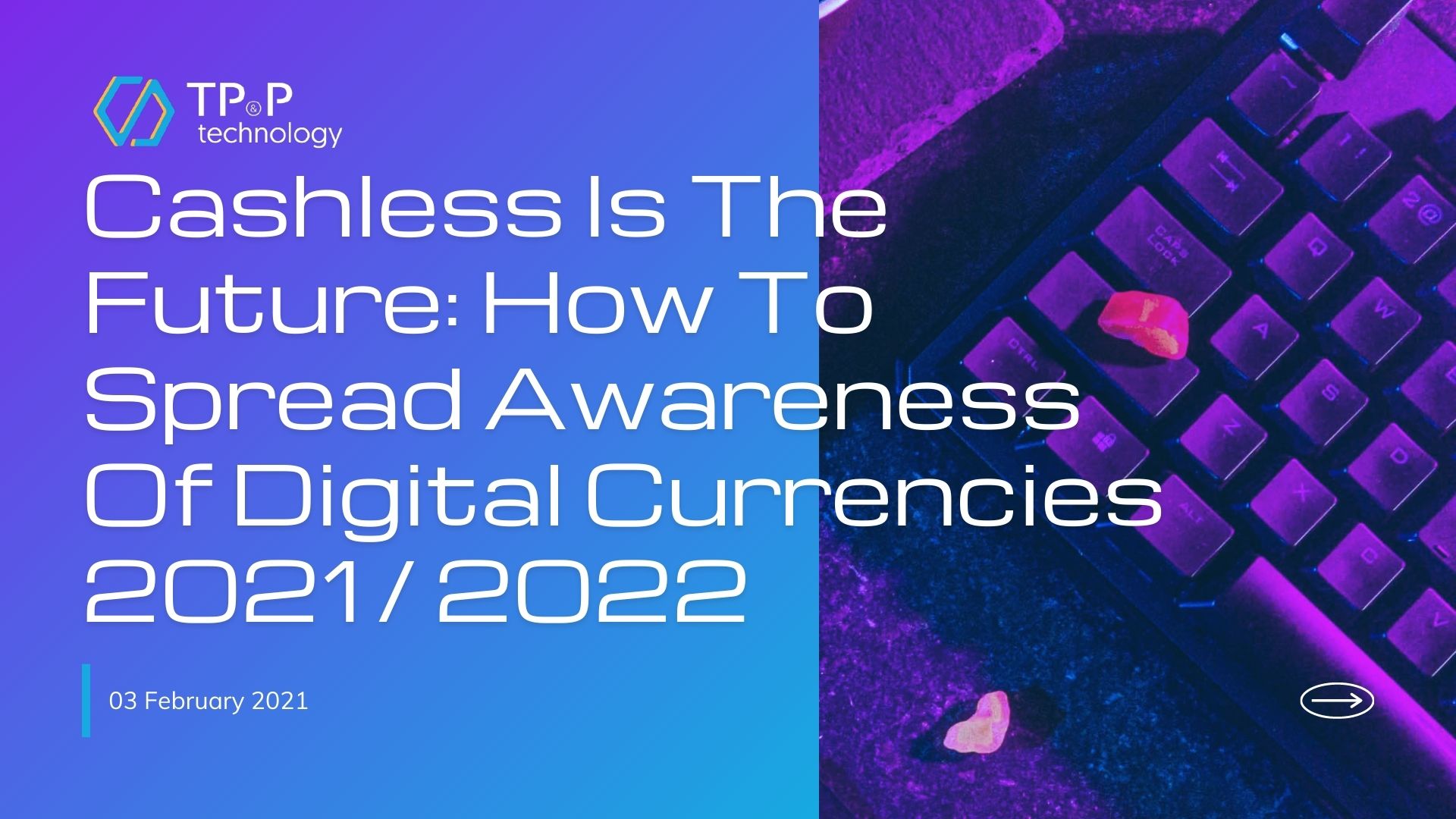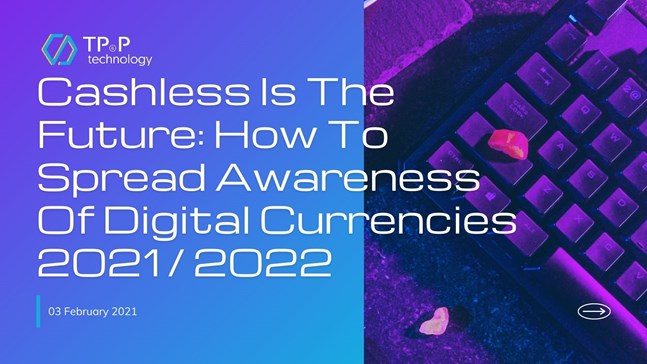
The Need to Spread Awareness Of Digital Payment & Crypto-Currencies In 2021 / 2022
Moving to 2021, people now prefer an alternative way to carry cash - a digital wallet, due to its convenience, especially during the current situation. However, many organizations worldwide are exploring the reasons to better prepare their adoption and/or even own digital currencies launch. Going digital with your finance has significantly been recognized by the public due to its facilitation, which has become the cardless trend’s driving factor.
Even though Bitcoin’s current market cap value is almost at a trillion U.S dollars (976.59 Billions Dollars as of the time writing), it is quite interesting knowing that almost 79 percent of cryptocurrency owners are buying their coins, while the rest are mining.
Indeed, there are still a lot of untapped potential for digital payment and crypto-currencies. For this news, let’s take a quick look at the benefits of digital payments and how to spread the awareness of digital currencies in 2021-2022.
A - Benefits
Thorough innovation for financial solutions
Digital payments, crypto-currency, and the blockchain technology itself are developing in the direction of innovative technology, which is rapidly changing global financial management.
Via digital wallet apps, together with cryptocurrencies, transaction fees and time can be significantly reduced, while the volume of processing can be increased dramatically, and especially users can make payments at anywhere, anytime as long as there's internet connnection.
This is due to the fact that payments made using crypto currency are made directly between the parties related to the transaction without any intermediary, which makes the transaction fast and low-cost.
You also benefit from it and can prevent fraud that may accompany chargebacks. Moreover, some users are embracing crypto-currency as they believe it could be an effective method of protecting their assets against inflation.
Digital entrepreneurship ecosystem
There is no doubt that the recent technological innovations have profoundly impacted entrepreneurship and company innovation. This results in developing the Digital entrepreneurship ecosystem (also commonly known as DEE), which is now being shaped through digital technologies. DEE enables people to build businesses and produce results from them. Besides, as the public becomes more and more familiar with technology, collective intelligence develops.
This can help provide a framework for further development of DEE. Today, we have found successful cases in process-driven, product-driven, and resource-driven DEEs. The South African market is a prime example; technology has paved the way for the massive growth of e-commerce and businesses here.
Infrastructure supported by blockchain technology
Some developing countries often face an unreliable financial environment, which may pressure foreign investment to diminish. Even so, a trustworthy ecosystem can be established among independent participants.
This system can be used to provide a secure, autonomous way for self-regulating data ownership and programmable smart contracts. Thus, this will make the blockchain more reliable, secure, private, regulated, and more efficient to outperform traditional currencies.
Meet liquidity requirements
Liquidity refers to the ease with which an asset, or security, can be converted into ready cash without affecting its market price. For many businesses, liquidity is vitally important since it allows business leaders and stakeholders to pay off short-term debts and liabilities.
Four important traits of liquidity are fair prices, market stability, quick and technical analysis. This makes liquidity a critical element in any tradable asset, which explains why cryptocurrencies can significantly impact companies operating in the developing country market.
This is because liquid markets are smoother and simpler to enter or exit. On the other hand, inferior market liquidity can worry traders as they find it difficult to exit the market, leaving them worthless in the future.
Near-anonymous online transactions
Although anonymous transactions or correspondences conducted by internet users is both beneficial and risky, it can help reduce the transaction cost managed by intermediaries. Consider the third-party’s role that is required to regulate financial transactions.
Most of them are financial institutions that are often found working on a trust-based model, in which transactions must be reversible because they may face disputes that they have to mediate. This increases their mediation costs.
However, using digital currencies can avoid all these costs since their transactions are based on evidence or encrypted evidence instead of trust.
Third-party authorization and central supervision can be avoided when using a distributed ledger. So, for example, if someone pays in bitcoin, they will not only benefit from the autonomy of the user but also the discretion of their purchase.
Open transaction/ Easy transfer options
Cryptocurrency can be traded like other currency. This means that companies who want to convert their digital assets into cash or currency approved by their local government can do this in a safe environment.
As the matter of fact, there are several online tutorials that can help you to become a cryptocurrency trader almost anywhere in the world. All they have to do is find a functional exchange that operates in their area and find out the exchange’s reputation.
Next, they need to research some of the popular exchange rates to see if they can find the right offer for their digital assets. One of the largest and most popular cryptocurrency exchanges are Coinbase, and Binance.
Poverty reduction
Due to the continuing advancement of technology, digital currencies can provide a model that can help developing countries eradicate poverty indefinitely. Not only do cryptocurrencies can provide easy access to financial services, but they can also help drive economic growth by increasing transparency and reducing frauds.
Cryptocurrencies can provide people with financial inclusion, defined as equal access to financial services, that can clearly help improve their livelihoods.
B - The need to spread awareness of the technology behind crypto-currencies
Contemporary currencies are supported by laws, currencies, and financial institutions; however, as far as cryptocurrencies are concerned, the elements of trust are provided via technology. In order to increase users’ confidence in digital currencies, it is necessary to understand and promote the basic characteristics of the technology involved in making encrypted currencies trustworthy.
When this research is published to audiences in third-world countries, it will help determine the functionality, reliability, and practicality of digital currencies.
Since trust is an important factor in financial transactions and payments, it is best to first understand the reliability of cryptocurrencies before introducing them into new markets. It should also allow people to delve into the topic of how cryptocurrencies use cryptocurrencies to verify transactions.
Internet growth and related innovations
Blockchain, with its ability to work well with other major technological breakthroughs, has become well-received. The technology can be integrated with other technologies to have a greater impact not only on the financial services industry but on the general public as well. In fact, blockchain technology can be used to integrate with big data so that various new analysis can be performed, such as predicting the possibility of future transaction activities.
Also, blockchain technology can be used to prevent fraud, develop an identity as a service, and various data management innovations.
Along with the internet of things (IoT) connectivity and 5G support, it can shape the future of technology and the entire ecosystem. In fact, some people include blockchain development resume skills on their CV to attract recruiters and explore the opportunity.
Top growth opportunities in the future
Many high-tech companies have been investing in blockchain technology, taking IBM for example, IBM is providing blockchain technology solutions for companies that deliver practical outcomes. We find that the traditional banking industry is looking at using this technology to improve its performance.
Another example is the German bank ReiseBanki, which uses blockchain technology to complete instant payments between its cross-border customers and complete transactions within 20 seconds.
Compare to traditional methods, the technology also saves banks a lot of money by reducing excessive bureaucracy, speeding up transactions, reducing costs, and improving security.
Side-note
Obviously, blockchain can be a good way to combat fraud and enhance transparency in financial markets globally. Blockchain and cryptocurrency can help counter various obstacles affecting the development of third-world nations and may prevent their further development.
Business organziations around the world are planning to adopt blockchain-based systems to enhance their finance and payment systems. Now is the time for us to build awareness to take advantage of this new form of payment, along with the innovative technology.
If you want to know more about how you can start your blockchain project, contact us now to talk to one of our experts.At TP&P Technology, we provide IT consulting services and software development outsourcing services. We are one of the Trusted Offshore Software Development Center in Vietnam



